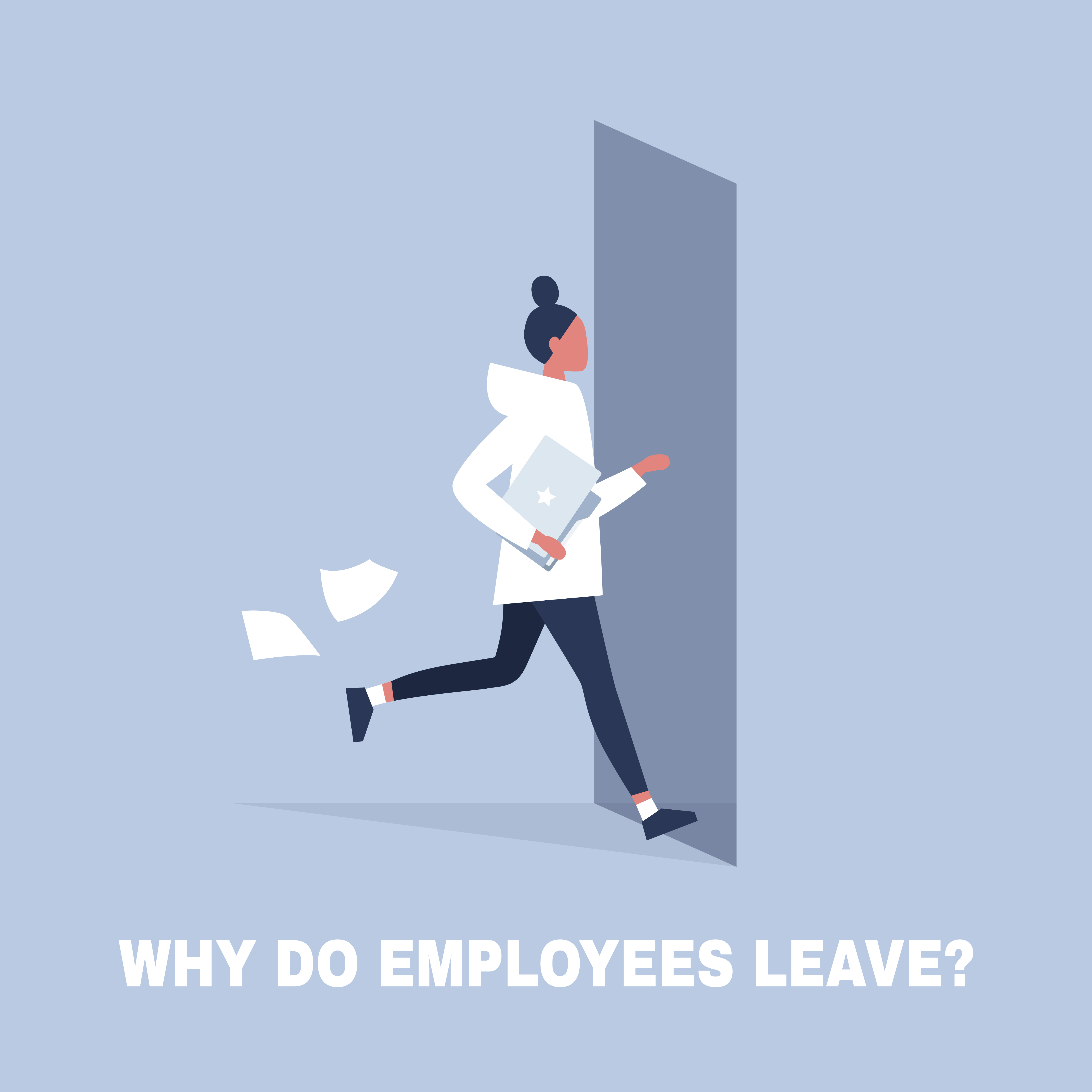Hospitality jobs have some of the highest turnover rates.
Here are eight reasons why employees leave hospitality jobs and what you can do to increase retention.

8 Reasons for Employee Turnover in Hospitality
Staffing in the hospitality industry can be chaotic and complex, even in the best of circumstances. Whether you are hiring for an event venue, hotel, trade show, catering company or stage crew - the hospitality and event industry comes with unique staffing and scheduling challenges. Add in a high employee turnover rate and basic staffing becomes significantly harder.
Unfortunately, employee turnover in the hospitality industry is extremely high. In fact, according to the U.S. Bureau of Labor Statistics, the Leisure and Hospitality industry has some of the highest job separation rates of any industry in the United States. Some of this comes with the territory of seasonal, event and contract work - employees change careers, go back to school, work temporarily during transition periods in their own lives. However, the majority of reasons why employees leave their jobs are within the employer's control.
Regardless of why, in a customer-facing industry, having employees constantly moving on can make it difficult to meet customer expectations day-to-day. Not to mention, it’s incredibly stressful to be chronically understaffed and costly to hire and onboard new talent. Unfortunately, because hospitality often relies on part-time and seasonal workers, it can be difficult to find people willing to stick around long-term.
As mentioned, some turnover is natural. Most HR experts agree that a 10-15% annual turnover rate is healthy across all industries. Yet, the Bureau of Labor Statistics concludes that turnover in the hospitality industry hovers around 70-80% annually. Yikes. If you are noticing an influx of employees leaving your company (particularly if it’s your top employees putting in their notice), you’ll want to fix that. And in order to solve a high-turnover problem, you’ll need to understand why good workers are likely to leave in the first place.
Here are 8 critical reasons employees are leaving their hospitality jobs:
1. A Bad Boss
At its core, hospitality work is people-focused and management positions are no exception. The boss does more than manage business operations, they manage people. A good manager provides feedback, connects employees to the larger company and mission, manages conflict, and runs the day-to-day delegation of duties.
Job satisfaction is heavily linked to the relationship a person has with their boss. A bad relationship with the person an employee reports to undermines performance, commitment, and morale. Managers should have a healthy relationship with their direct reports. This includes two-way communication, an ability to hear criticism and feedback, and clear and consistent expectations. If a manager is unable to communicate effectively or is a source of toxic behavior, employees will leave.
Thoughtful hiring and proper training for management positions are essential. Don’t make the mistake of assuming that a great employee will make a great boss. Leadership positions carry very different responsibilities and required skill sets beyond typical non-management positions. Set clear expectations of your managers and push for ongoing management training. Seek feedback from employees on management’s performance and build time for two-way feedback between management and direct reports.
2. A Bad Match
Not everyone is equipped to deal with the unique demands of the hospitality industry. Customer-facing jobs can be stressful and exhausting and are not right for everyone - something that many employees don’t realize until after they’ve been hired. This is especially true for young hires just starting out in their careers.
Proper training and dedicated management can help new employees develop the skills they need. Undertrained employees don’t perform their best and they often know it - which can contribute to needless stress and, eventually, an exit.
However, a truly bad fit should be weeded out during the hiring process. Set clear expectations on what personality traits the position requires and actively look for those traits in your interviewees. Working interviews and personality assessments can help you ensure you hire a good personality fit.
3. The Pay Sucks
Money can’t buy happiness, but trying to live off too little money can certainly make you miserable. The hospitality industry is booming and with that comes more jobs than there are workers. This means you’ll need to stay competitive pay-wise if you want good staff to stay.
When employees don’t feel they are being paid what they’re worth they are likely to move on. This is especially true if they know they could make more at a comparable businesses. Periodically review your rates with those of similar sized hospitality businesses in your area and ensure you’re offering competitive wages. Consider boosting the benefits you offer; time off, flexibility or other benefits can make up for a slightly lower salary in an employee's eyes.
4. Unclear Expectations
You could have the best fit in the world, but if they show up each day unsure of what they are meant to do - you’re going to lose them. There’s nothing more stressful than showing up for work without a general idea of what is expected of you.
More importantly, employees will quickly become unhappy if their job doesn’t align with what they think they were hired to do. During an interview it can be tempting to focus on only the positives of a job or to make the work sound more appealing in your job description by omitting certain tasks. While that may get employees in the door, it’s not likely to keep them there once reality sets in.
Setting expectations starts with a well-written job description and should be reinforced day-to-day by management. During the hiring and onboarding process, be clear about what the job entails, even the less than glamorous parts. This will help you find an employee willing and capable of doing the actual job you hired them for and remove any ambiguity over what their work includes.
5. A Toxic Work Environment
As with a bad boss, a toxic work environment will chew-up and spit out good employees, leaving only those willing to put up with (or contributing to) the toxicity. Hospitality is often a high-pressure work environment, leaving even the best employees frazzled some days. Most employees can weather the stress. It’s an unhealthy work environment that will drive them to find employment elsewhere.
Sexual harassment, bullying, and unwarranted favoritism can wreak havoc in the workplace. Sadly, 63% of hospitality workers have experienced an incident of sexual harassment on the job. Meaning it's important to be intentional about the type of environment you want to foster within your business.
A healthy working environment is not built accidentally. It requires proactive, ongoing efforts from leadership. To develop a positive working environment, establish clear policies for escalating bad behavior from coworkers, management or customers. Proactively look for feedback from your current employees and model healthy workplace behavior from management downward. Beyond the obvious, employees appreciate a workplace with transparent communication, approachable management, and clear direction.
6. Lack of Predictability with Scheduling
A certain level of unpredictability is unavoidable in the hospitality and event industry. Employees rarely work set schedules or have consistent days off. The irregularity and non-standard hours can actually be a huge draw for employees looking for more flexibility. However, a schedule that comes out two days before the week starts, an inability to take days off, or unexpected overtime can add stress that will ultimately drive your employees away.
Employees don’t want to wait until the last minute to know when they will work. They also want some say in their days off, the times they’re available to work, and how many hours they work on a regular basis.
This means scheduling should not be a hurried, afterthought. Keep a clear and consistent scheduling system and create straight-forward procedures for employees to request time off. Release the schedule on a set cadence that your employees can rely on. If it’s going to be late (which it rarely should be) then clearly communicate that with staff. Be transparent about overtime needs and give as much lead-time as you can with any scheduling changes.
7. Not Enough Opportunities for Growth
Many hospitality workers start out in the industry at a young age - in fact, hospitality positions are often first jobs for high school and college students. However, not many choose to stay in the industry throughout their careers. One of the biggest contributing factors to this is the actual or perceived lack of opportunities for career advancement.
Unfortunately, often part-time or seasonal employees are treated as an afterthought. Many companies provide minimal training, little skill development, and no clear avenue to full-time status or upward advancement for these employees. When a person feels undervalued they don’t stick around. If an employee does not feel as if their employer is invested in them, they won’t invest in their employer either.
Creating clear pathways to higher positions and developing growth plans for all employees can work to combat this. Managers should take time to invest in seasonal and part-time hires with 1:1 time and skill development. Most importantly, ask your employees if they want to advance in their role and at your company. Some don’t, and that’s ok, but others are looking for the opportunity of long-term growth and career advancement.
8. No Recognition
Hospitality positions are often demanding, consuming jobs with long hours, irregular schedules, and lots of potential stress. Unfortunately, many hospitality and event staffers feel underappreciated by upper management. It can be easy to take hard-workers for granted without meaning to; we tend to focus attention and energy on those not doing their job well instead of on the reliable workhorses on the crew.
But consistently working hard only for that work to (seemingly) go unnoticed can quickly lead to burnout and resentment. Recognition matters and workplaces that take time to applaud their employees accomplishments have higher morale and better retention than those who take employees for granted.
Recognition doesn’t always have to be a big deal. A shout out during a staff meeting or a simple thank you go a long way towards making employees feel good about their work. For more significant accomplishments gift cards, bonuses or extra time off can motivate employees. Recognition alone will not keep employees around if there are other dysfunctions, but it is one aspect of company culture that you’ll want to consider when thinking about retention.
You won't keep every employee you hire (nor do you likely want to), but poor employee retention can create undue headaches in any sector of the hospitality industry. High turnover may be common in the industry, but it does not need to be common at your business.
Everything from hiring well to proper performance tracking can make the difference when it comes to keeping employees around. Use Schedulehead to make managing staffing logistics simple. Manage staff and event scheduling, track employee performance metrics, utilize time tracking reports, and more.
Roosted can add value to the entire chain. Contact a Client Success Engineer for more advice on how we can support your business.
